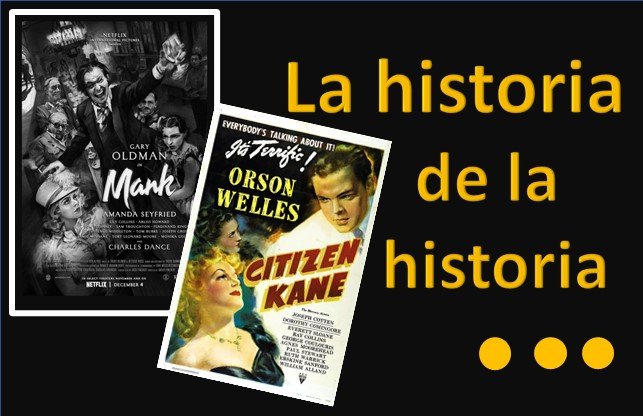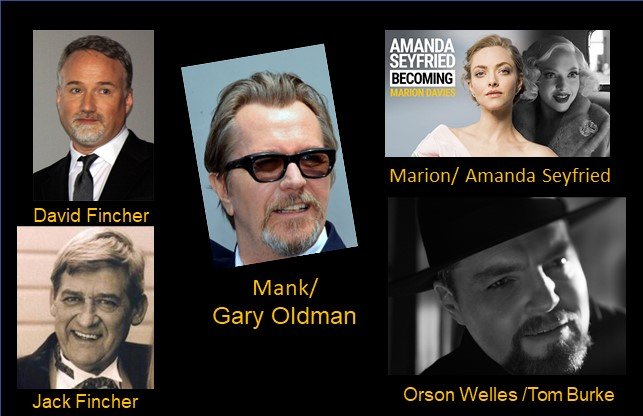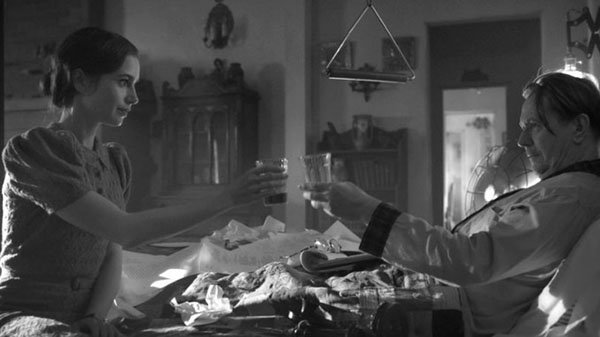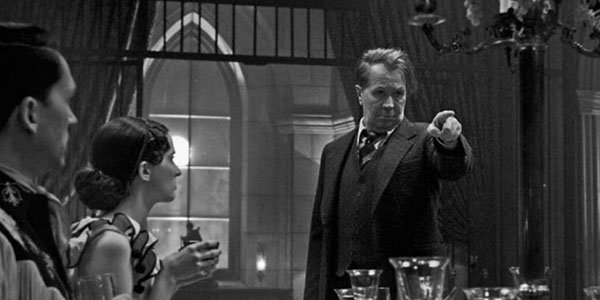
Mank nos relata los hechos que hicieron posible la legendaria película Ciudadano Kane (1941) de Orson Welles y es precisamente en esta presentación “de Orson Welles” donde se centra una de las polémicas, que, durante 80 años, se ha mantenido alrededor del Ciudadano Kane, película, que para muchos es catalogada, como la mejor realización del cine.
Mank (2020) la última entrega del director David Fincher que le da vida al guión escrito por su padre, Jack Fincher, en los años `90 y que no lograron producirla por tratarse de una película en blanco y negro, lo cual no resultaba atractivo para los estudios. Sin embargo, esta monocromía, acompañado de un ritmo que se logra cuando se relatan hechos históricos hacen del film algo completamente distinto a lo que nos ofrece el cine actual en general y a lo que particularmente ha sido la filmografía de Fincher.
Protagonizada por Gary Oldman en el papel de Mank (Herman Mankiewicz); entre el reparto destacan: Amanda Seyfried (Marion Davies); Lily Collins (Rita Alexander); Tom Burke (Orson Welles); Charles Dance (William Randolph Hearst), entre otros.

Mank tells the story of the events that made possible the legendary film Citizen Kane (1941) by Orson Welles and it is precisely in this presentation "Orson Welles" where one of the controversies that, for 80 years, has been maintained around Citizen Kane, a film that for many is cataloged as the best achievement of cinema, is centered.
Mank (2020) is the latest film by director David Fincher, who brings to life the script written by his father, Jack Fincher, in the 1990s, which they were unable to produce because it was a black and white film, which was not attractive to the studios. However, this monochrome, accompanied by a rhythm that is achieved when historical events are recounted, make the film something completely different from what current cinema offers us in general and what particularly has been Fincher's filmography.
Starring Gary Oldman in the role of Mank (Herman Mankiewicz); the cast includes: Amanda Seyfried (Marion Davies); Lily Collins (Rita Alexander); Tom Burke (Orson Welles); Charles Dance (William Randolph Hearst), among others.

Finales de los años treinta es el escenario, si bien el cine ya tenía un camino recorrido las técnicas eran aún poco sofisticadas y las actuaciones eran más al estilo “sobreactuación”, heredadas del teatro. En Mank se utilizan todos los recursos actuales para recrear la atmósfera que marcaron la época, el vestuario y maquillaje van haciendo su magia e incluso hay una escena que nos hace remembrar un momento visto.
The end of the thirties is the stage, although the cinema had already come a long way, the techniques were still unsophisticated and the performances were more in the "overacting" style, inherited from the theater. In Mank all the current resources are used to recreate the atmosphere that marked the era, the costumes and makeup work their magic and there is even a scene that reminds us of a moment we have seen.
El protagonista y la trama
Mankiewicz (Mank) es un guionista alcoholizado, reconocido y valorado en el medio cinematográfico por sus guiones atrevidos, sin embargo, su atrevimiento, la manera poco delicada para decir las cosas y la impertinencia que da el alcoholismo le han ido cerrando puertas en el medio. Por otro lado, tiene una sensibilidad social profunda y activa a tal punto que con sus influencias y recursos ha logrado sacar familias de la Alemania hitleriana.
Mank tiene un accidente automovilístico con múltiples fracturas en una pierna, con pocos recursos y falto de contratos, Orson, le propone escribir un guion en un período de 3 meses, para lo cual lo ubica en un sitio alejado de su familia, con una secretaria, una enfermera y unas botellas para que en algún momento que se atreva y comience a caminar las alcance.
Pasan dos meses y apenas si ha escrito 60 páginas de las 280 que se requieren. Ha logrado caminar hacia las botellas, pero se da cuenta que la bebida esta adulterada y lo dopan perdiendo la consciencia apenas comienza a beber. Este es un punto clave en la vida de Mank porque reconoce que es en estado de embriaguez donde tiene mayor lucidez para escribir, en consecuencia, busca quien le traiga su bebida y comienza a trabajar.
Prácticamente en las tres semanas que le faltan para que termine el plazo escribe el Ciudadano Kane. Un guion de denuncia que pone de manifiesto el poder de la prensa y de los medios en general para crear matriz de opinión, logrando manipular al público y obtener respuestas inducidas para objetivos determinados.

The protagonist and the plot
Mankiewicz (Mank) is an alcoholic screenwriter, recognized and valued in the film industry for his daring scripts, however, his boldness, the indelicate way to say things and the impertinence that gives alcoholism have been closing doors in the medium. On the other hand, he has a deep and active social sensitivity to such an extent that with his influence and resources he has managed to get families out of Hitler's Germany.
Mank has a car accident with multiple fractures in one leg, with few resources and lack of contracts, Orson, proposes him to write a script in a period of 3 months, for which he places him in a place away from his family, with a secretary, a nurse and some bottles so that at some point he dares and begins to walk to reach them.
Two months go by and he has barely written 60 pages of the 280 that are required. He has managed to walk to the bottles, but he realizes that the drink is adulterated and he is doped and loses consciousness as soon as he begins to drink. This is a key point in Mank's life because he recognizes that it is in a state of drunkenness that he has the greatest lucidity to write, so he looks for someone to bring him his drink and begins to work.
Practically in the three weeks left before the deadline he writes Citizen Kane. A denouncing script that highlights the power of the press and the media in general to create a matrix of opinion, manipulating the public and obtaining induced responses for specific objectives.
Mark toma los personajes de su guion de la vida real y haciendo uso del flas-black le va dando al espectador los hechos concretos de la trama global del mismo. Así encontramos unas elecciones para la gobernación de California Estados Unidos liderizadas por el socialista Sinclair donde se manipuló a la población con el trabajo de un poderoso de la prensa (William Randolph Hearst, representado por Charles Dance en Mark y que es el ciudadano Kane en la obra de Orson Welles) en un momento histórico como lo fue la recesión económica de la época. El escrito plasma una realidad y unos personajes tan conocidos en ese momento que nadie quería producir la película. Una cosa es cierta, para comprender, con cierta profundidad, la película Mark es conveniente haber visto el Ciudadano Kane.
Mark takes the characters of his script from real life and using flashbacks he gives the viewer the concrete facts of the overall plot. Thus we find an election for the governorship of California United States led by the socialist Sinclair where the population was manipulated with the work of a powerful press (William Randolph Hearst, represented by Charles Dance in Mark and who is the citizen Kane in the work of Orson Welles) in a historical moment as was the economic recession of the time. The writing captures a reality and characters so well known at the time that no one wanted to produce the film. One thing is certain, to understand, with some depth, the film Mark it is convenient to have seen Citizen Kane.
Siendo una película biográfica Mark nos muestra la decadencia de un hombre, el proceso de autodestrucción de una “mente brillante” y una vivencia social donde se palpa y se siente las ramificaciones del poder. Ya hacia el final de la película Mark le pide a Orson reunirse, en el encuentro le plantea que quiere los créditos de su obra. Orson se indigna, se pierde la amistad y el Ciudadano Kane en 1942 gana un Óscar compartido. Siempre quedará la duda de cuanto aportó Orson a la obra que dirigió y protagonizó.
Being a biographical film, Mark shows us the decadence of a man, the process of self-destruction of a "brilliant mind" and a social experience where the ramifications of power can be felt and felt. Towards the end of the film, Mark asks Orson to meet with him, in the meeting he asks for the credits of his work.
Orson is outraged, the friendship is lost and Citizen Kane in 1942 wins a shared Oscar. The question will always remain as to how much Orson contributed to the work he directed and starred in.
Translated with www.DeepL.com/Translator (free version)
Fuente de imágenes: Portada 1- 2 Editada en PowerPoint
Cartel: 1 - 2 - 3 - 4 - 5 Editado en PowerPoint.
Imágenes: 1 - 2




MIS REDES SOCIALES






Gracias por pasar y el apoyo.